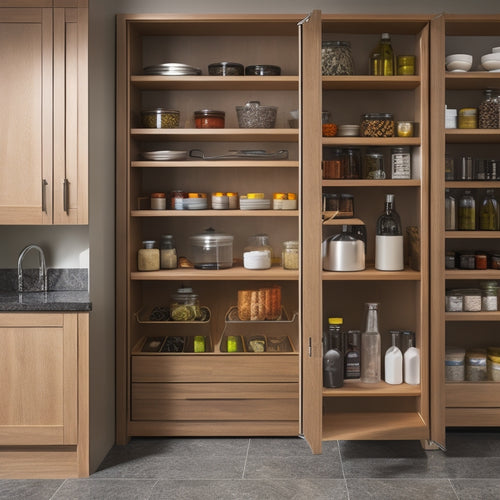
Navigating Health Permits for Food Facilities
Share
Understanding health permits for food facilities is a complex task that demands thorough knowledge of regulations and requirements. Different facility types, like restaurants, markets, and wholesale manufacturers, have unique permit requirements to prevent health code violations. Obtaining the necessary permits and licenses is vital, as non-compliance can lead to severe consequences. When taking over an existing facility, new ownership requires a new health permit, and construction or equipment changes demand written approval from the Environmental Health Division. Understanding specific requirements and regulations is crucial to successful permit application and maintaining compliance. To guarantee a smooth operation, it is important to grasp the intricacies of the permit process.
Key Takeaways
• Obtain a health permit specific to your facility type, as permits are not transferable and non-compliance can lead to penalties.
• When taking over an existing facility, start the permit process promptly and submit required compliance documentation for approval.
• Construction or equipment changes require written approval from the Environmental Health Division to ensure compliance with standards.
• Cottage Food Operations must comply with regulations, obtain local approval, and submit required documentation to operate legally.
• Research and understand specific requirements for your facility type, including additional licenses and permits, to avoid serious consequences.
Food Facility Types and Requirements
A diverse variety of establishments, including restaurants, bars, markets, school cafeterias, food trucks, commissaries, food booths at events, certified farmers markets, and wholesale food manufacturers, are classified as food facilities and require a valid health permit to operate. This permit guarantees that food is handled, prepared, and served safely to prevent health code violations.
It is important to note that health permits are not transferable, and each facility must obtain its own permit. Failure to comply with health codes can result in permit revocation, fines, and even facility closure. Understanding the specific requirements for each type of food facility is vital to maintaining a safe and healthy environment for consumers.
Taking Over an Existing Facility
When acquiring an existing food facility, it is crucial to start the permit process promptly to secure uninterrupted operation and compliance with health codes.
Health permits are not transferable, so new ownership requires a new permit. Contact the Environmental Health Division to start the process, which includes necessary inspections to guarantee compliance.
Submit required compliance documentation for the health permit application, as failure to adhere may lead to closure and penalties. Facility upgrades may be essential to meet health code standards.
Conducting thorough inspections and reviewing compliance documentation will help identify areas for enhancement, securing a smooth ownership transfer and continued operation.
Construction and Equipment Changes
Facility construction, remodeling, or equipment changes necessitate obtaining written approval from the Environmental Health Division prior to commencement. This is essential to guarantee compliance with safety regulations and prevent potential hazards.
Equipment upgrades, for instance, can have a significant impact on operational changes, and as a result, require careful evaluation. Renovation plans and specifications must be submitted for review, and plan approvals obtained before construction begins.
Preliminary and final inspections are necessary to make sure that all changes meet applicable standards. Failure to obtain written approval can lead to costly rework, delays, or even facility closure.
Cottage Food Operation Requirements
How do Cottage Food Operations (CFOs) differ from traditional food facilities regarding permits and regulations?
CFOs are exempt from certain permit requirements, but still must comply with CFO regulations.
To operate a CFO, you must obtain approval from the local environmental health agency.
The permit application process involves submitting required documentation, such as a CFO registration form and a self-certification checklist.
CFOs are limited to specific low-risk food products, and operators must follow proper food safety guidelines.
It is crucial to understand the CFO regulations and requirements to guarantee a successful permit application.
Additional Licenses and Permits
Beyond the health permit, food facilities may require additional licenses and permits to operate legally, including an Employer Identification Number, Liquor License, Sellers Permit, and Workers Compensation Insurance, among others. These additional permits and licenses are necessary to guarantee compliance with regulatory requirements and to operate a food facility safely. Food facilities must obtain all necessary regulatory approvals and certifications to avoid penalties and closure.
It is essential to research and understand the specific requirements for each food facility type, as they may vary. Failure to adhere to these requirements can result in serious consequences. By obtaining all necessary additional permits and licenses, food facilities can ensure a safe and legal operation.
Health Permit Application Process
Prior to submitting a health permit application, it is important to gather and prepare all necessary documents and information to guarantee a smooth and efficient application process. This includes making sure all permit documentation is complete and accurate, as incomplete or inaccurate applications can lead to delays in processing.
To maintain health code compliance, it is essential to review and understand the relevant health codes and regulations. Additionally, it is crucial to:
- Verify the type of food facility operation to determine the correct permit type and fees
- Make sure all necessary plans and specifications are submitted for review
- Provide accurate and detailed information about the food facility, including equipment and menu items
- Respond promptly to any requests for additional information or clarification during the application process
Maintaining Compliance and Inspections
To ensure ongoing compliance with health codes and regulations, food facilities must undergo regular inspections and maintain accurate records of their operations, equipment, and menu items. Effective inspection preparation is crucial, involving compliance monitoring, staff training, and making sure all necessary documents are up-to-date.
Food facilities should stay informed about health code updates and regulatory changes, adapting their operations accordingly. Regular self-inspections can help identify potential issues before they become major problems. By maintaining compliance, food facilities can prevent costly penalties, reputational damage, and even closure.
It is vital to prioritize compliance and stay vigilant to guarantee the safety and well-being of customers and employees alike.
Frequently Asked Questions
Can I Operate a Food Facility From My Home Address?
"Consider Sarah, a baker operating from her home kitchen, wondering if it's feasible. Home-based food operations must comply with zoning regulations, ensuring residential areas aren't compromised. Verify local ordinances before pursuing a home-based food facility."
Do I Need a Health Permit for a One-Time Food Event?
For a one-time food event, a temporary health permit is typically required, depending on the event's scope and food handling activities. Event catering operations may need temporary licenses, ensuring compliance with health codes and regulations.
Are There Any Exemptions From Health Permit Requirements?
In special circumstances, exemptions from health permit requirements may apply, such as private events or charitable functions, but these exemptions are rare and typically require pre-approval from Environmental Health authorities.
How Long Does It Take to Get a Health Permit Approved?
"Contrary to common misconceptions, health permit approval timelines vary, but expedited processing is possible. Delays often stem from incomplete applications or common mistakes, such as inadequate plan submissions, highlighting the importance of thorough preparation and accurate documentation."
Can I Appeal a Health Permit Denial or Revocation?
In the event of a health permit denial or revocation, a facility may initiate a permit appeal process, exploring legal options, and addressing non-compliance issues identified during the health inspection to guarantee regulatory compliance.
Related Posts
-

Space-Saving Lazy Susan Cabinet Solutions
Space-saving Lazy Susan cabinet solutions can change those awkward corner spaces into organized storage wonders. You'...
-

Innovative Lazy Susan Storage Solutions
Innovative Lazy Susan storage solutions are a revolutionary advancement for any space, especially in kitchens. They m...
-

Best Vertical Storage Solutions for Small Kitchens
In a small kitchen, vertical storage solutions are your secret weapon to maximize every inch of space and keep your c...


